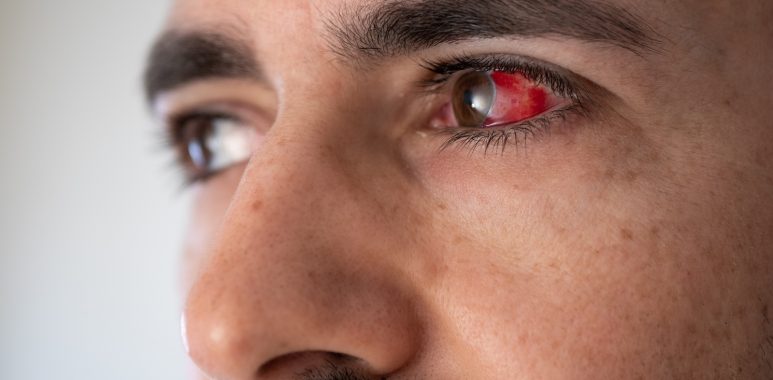
Some Causes of Broken Blood Vessel In The Eye
Some Causes of Broken Blood Vessel In The Eye. Are you aware of the warning signs of breaking a blood vessel in the eye? The sight of a blood vessel in the eye is a frightening and concerning experience for anybody.
Besides causing significant discomfort, it can also signal a more serious health problem at hand. Learn why blood vessels break in the eye, the symptoms it causes, and the treatment it provides.
Table of Contents
Introduction
A broken blood vessel in the eye can be an alarming sight. It is usually caused by minor trauma such as sneezing or coughing too hard, and the medical term for this condition is subconjunctival hemorrhage. A broken blood vessel in the eye can be frightening at first glance, but in most cases it is harmless.
What is a Broken Blood Vessel In The Eye?
Blood vessel ruptures in the eye, also known as subconjunctival hemorrhages, occur when a small blood vessel in the white part of the eye (the sclera) ruptures and bleeds.
Typically, this condition does not result in pain or loss of vision but may result in a red or pink patch on the eye. Eye strain, high blood pressure, and eye injuries are all causes of broken blood vessels in the eye.
It is common for a broken blood vessel in the eye to heal on its own within two weeks without any intervention. Nevertheless, if you experience any type of vision loss or severe pain, you should seek medical attention as soon as possible.
Causes:

Breaking a blood vessel in the eye can be caused by several factors. Some of the most common are as follows:
- The rupture of a blood vessel can occur as a result of trauma to the eye, such as an injury sustained during sports.
- Blood vessels in the eye can become fragile and more susceptible to rupture due to high blood pressure.
- The pressure from vomiting or coughing can rupture a blood vessel in the eye as a result of vomiting or coughing.
- The use of blood-thinning medications such as aspirin and warfarin may cause blood vessels to become more fragile and more susceptible to rupture.
- The blood vessels in the eyes become weaker with age, resulting in a greater likelihood of them bursting.
- There is the possibility of inflammation and rupture of the blood vessels in the eye due to allergy symptoms.
- A person with dry eye may experience brittle and easily breakable blood vessels in their eyes as a result of the condition.
Symptoms:

The most obvious symptom of a broken blood vessel in the eye is a red or pink patch on the white part of the eye. This patch may be small or cover a large area, and it may be accompanied by mild discomfort.
Treatment:

It is usually not necessary to treat broken blood vessels in the eye, as the condition usually resolves on its own within a few weeks. However, if the rupture causes severe discomfort or interferes with vision, your doctor may recommend the following treatment:
- Artificial tears: Artificial tears can be used to alleviate discomfort and lubricate the eye.
- Topical antibiotics: These medications may be prescribed if an infection is present.
- Blood pressure medication: Medication may be prescribed to lower blood pressure to prevent future ruptures if the broken blood vessel is caused by high blood pressure.
- Surgery: A broken blood vessel in the eye can be repaired surgically in rare circumstances.
Prevention:

Even though it may not be possible to prevent every instance of a broken blood vessel in the eye, there are steps you can take to reduce your risk. These include:
- You can prevent a broken blood vessel from occurring in your eye by taking care of your eyes. Getting regular eye exams and wearing sunglasses while outdoors are the two most important things you can do.
- The walls of the blood vessels in your eyes become weaker when you have high blood pressure and cholesterol levels, making them more susceptible to breaking.
- Your eyes are put under a lot of strain, so it is important to take frequent breaks from activities that are harmful to your eyes. As an example, staring at a computer screen for too long may result in eye fatigue, which can result in broken blood vessels. Therefore, take regular breaks throughout the day to avoid this.
FAQs
Can a broken blood vessel in the eye be treated with home remedies?
It is typically not necessary to treat a broken blood vessel in the eye, however, some people may find relief from symptoms by applying a cold compress or artificial tear drop to alleviate discomfort. You should consult your eye doctor before using any home remedies to ensure that they are appropriate and safe for your specific condition.
Can a broken blood vessel in the eye be related to other eye conditions?
Broken blood vessels in the eye may be related to other eye conditions such as conjunctivitis, glaucoma, and retinal detachment. It is important to consult an eye specialist to determine if more serious conditions may be present.
Can a broken blood vessel in the eye recur?
The condition may recur if the underlying cause is not addressed. If a person has high blood pressure or diabetes, for instance, the condition may recur if the levels of blood pressure or blood sugar are not well controlled.
Can a broken blood vessel in the eye lead to vision loss?
The presence of a broken blood vessel in the eye is not typically associated with vision loss. However, it may increase the risk if the condition is accompanied by an underlying medical condition.
Is a broken blood vessel in the eye a serious condition?
A broken blood vessel in the eye is typically not a serious medical condition and will heal on its own within a few weeks. However, if the condition is the result of a medical condition, treatment may be necessary.
Conclusion:
It is common to experience a broken blood vessel in your eye due to trauma, high blood pressure, or medications that thin the blood.
The condition is generally harmless and resolves on its own; however, in certain cases, it may require treatment. It is important to maintain a healthy blood pressure level and prevent injury to your eyes to reduce your risk of a broken blood vessel.
